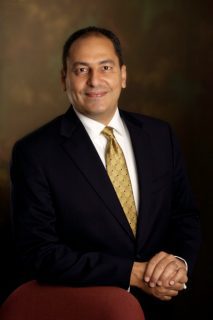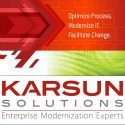
In the government contracting world, we hear a lot about mission. From company mission to supporting the missions of military and government agency clients, a sense of purpose informs and motivates every business with a government client.
Suntiva is a government contractor whose mission was shaped when the founder, Dr. Hany Malik, was just a boy. In an interview with WashingtonExec, Malik shared his unique, and very personal, mission to run a company with the core values he learned from an early age, as well as tips for completing the 8(a) program successfully.
WashingtonExec: Since Suntiva graduated from the 8(a) program this year with a large amount in revenues, what have you done to prepare your company for post-8(a) life?
Hany Malik: I think the process of preparing the company for post-8(a) began before we even applied for the 8(a) program by the choice of putting together a management team with significant experience running successful business in a free and open market. All of us have worked in Fortune 500 companies in the past and are quite used to thinking big.
When we started the company, the 8(a) vehicle was not something we were planning on, actually. From the very beginning we were interested in building a company that stands on its own and was built to last. The 8(a) was almost an afterthought for us; it was always considered as an additional contracting vehicle that enabled our government clients to access us directly and quickly. However, Suntiva was never designed to be an 8(a) company.
There’s a funny story, actually, I did not know about the 8(a) program at all and the suggestion came from one of our government clients who was trying to contract quickly with us. I happen to be a minority, and the client said, “Looking at you, it seems to me that you could qualify for an 8(a) program status.” So I applied and got accepted, which came in very handy as a way to facilitate and expedite the contracting for many clients in the early years of Suntiva.
WashingtonExec: What was your greatest challenge that you faced during your tenure with 8(a)?
Hany Malik: I think one of the greatest challenges not just I, but other 8(a) company leaders face as well, is not knowing how to interact effectively with the Small Business Administration (SBA). Companies end up losing a lot of time trying to understand the lay of the land and how the 8(a) program is structured, as well as how to make the most out of it and use it efficiently.
So that takes a little bit of time and unfortunately by the time you figure it out, four or five years have gone by out of this 9-year long program, and then you find out that by the time you figured it out, you only have two or three years left, which is not enough to make the most out of the program.
So one challenge has been trying to navigate the SBA rules and regulations and requirements quickly enough that you will have enough years left on the program to take advantage of the vehicle.
WashingtonExec: What advice do you have for those debating entering the 8(a) program?
Hany Malik: First, if you’re interested in an 8(a) program, start getting more familiar with the program before you even apply so you can gain familiarity without the clock ticking during the life of the program. That way, when you get approved for the program, you can hit the ground running.
Secondly, establish a close relationship with your designated business opportunity specialist. SBA assigns a specialist to each company. These folks are typically a bit overwhelmed because they are assigned many companies beyond their bandwidth to support and don’t have as much time to dedicate to each company as I’m sure they would like to have. Therefore, that responsibility falls on the company leader, particularly the owner of the company, to work hard to establish a good relationship with them so that when you need them, they know who you are.
Along this same line, I would advise businesses to refrain from getting frustrated by the bureaucracy. SBA is a government organization that runs at its own pace with lots of regulations that you must abide by. I think a common mistake is when business owners get frustrated by how slow the government is or how long it takes for SBA to get back to them. Getting bogged down in how the system can seem inefficient creates a negative atmosphere for you and your business opportunity specialist. So my advice is to accept it for what it is and be active and be positive in your relationship with the business opportunity specialist. They’re trying to help you, so give them what they need in time so that you can get routine tasks out of the way and get back to focusing on growing your business.
Finally, my advice for businesses is to use the 8(a) revenue to invest in the infrastructure of your company. Many 8(a) owners make the mistake of spending that revenue so that when you graduate you don’t end up with a mature, well-established infrastructure that can enable you to compete and win in the full and open market.
One thing that Suntiva did well is that we invested the revenue that came out of the 8(a) vehicle in maturing our internal processes and infrastructure so that when we graduated, we were ready to compete in the full and open environment.
WashingtonExec: Suntiva offers a blend for government clients including IT program management expertise, as well as organization performance and acquisition lifecycle expertise. Will you describe how this blend differentiates your company from the others who are competing in the marketplace?
Hany Malik: I think every company has to go back and remain true to its soul and original DNA, and we are fortunate that our original DNA is in the area of organizational performance. In other words, we specialize in helping organizations (especially IT, acquisition, and larger program office type-organizations) achieve significant, measurable and sustainable business results. What makes us unique is our blend of technical and domain expertise with our people, organization, and human capital expertise. Very few companies can integrate key technical and organizational elements together and provide clients with complete solutions that not only attend to the technical aspects, but also align the people and the organization around it.
The combination of Suntiva’s proven methodology, which has been developed for years, as well as the ability to put together integrated teams of both business and management consultants together with organizational development and management psychologists, have produced hundreds of very successful engagements and as many satisfied clients which give Suntiva its outstanding reputation in the market.
WashingtonExec: You have a unique life story, having grown up the son of the Episcopal Archbishop of North Africa, then you moved to the U.S. to pursue a successful academic career, followed by a successful professional career. Would you care to share a bit about some of the challenges you’ve faced over your life and some of the rewards that you’ve reaped as a result of meeting those challenges?
Hany Malik: Being raised by a priest and a true man of God taught me some great values that inform a lot of the values at Suntiva. It is not about religion, it just happened that these values are a great match to the old-fashioned values of what the United States was built on. For example, we have five values: one of them is do the right thing all the time, with the emphasis on “all the time”—because with the pressure of growing the business and competing, this particular value gets tested by employees, by partners, and by clients. I’m proud to say that, since the inception of Suntiva, I’ve always passed that test of doing the right thing all the time and I expect that everyone working at Suntiva will do the same.
Another Suntiva value that came out of my father’s teaching is to embody great minds and great hearts, which became our tagline. At Suntiva, we attract the best talent in the market in terms of having sharp minds, advanced technical skills, and deep domain expertise. But these qualities are not enough for Suntiva. We also wanted people with great hearts, which means in addition to being the best in your area of expertise, we also hire individuals who are genuine, oriented toward service to others, of high integrity, and simply being a pleasant person that other employees as well as clients would enjoy interacting with each day. All these things I learned from my dad, and they became the building blocks of the core values of the company. It is amazing how good personal values of a humble priest who lived in the East would resonate with the fast-paced industrial world of the U.S. in which we live.
That goes to show that good values are good values no matter who you are and where you live.


